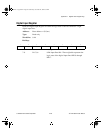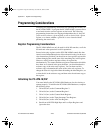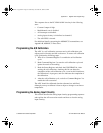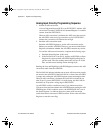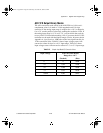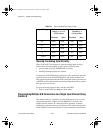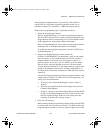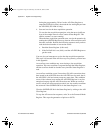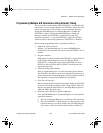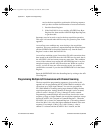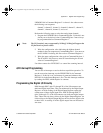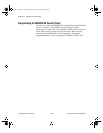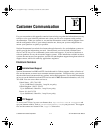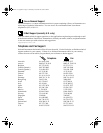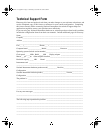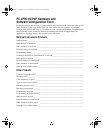
Appendix D Register-Level Programming
National Instruments Corporation D-33 PC-LPM-16/PnP User Manual
Programming Multiple A/D Conversions Using External Timing
You can use the external timing signal EXTCONV* for multiple A/D
conversions. A low-to-high transition of EXTCONV* initiates an A/D
conversion. Software can also initiate a data acquisition operation.
Setting the DISABDAQ bit in Command Register 2 disables the
EXTCONV* signal. Clearing the DISABDAQ bit in Command
Register 2 enables the EXTCONV* signal and starts the data
acquisition operation. To use the EXTCONV* signal, the OUT0 of
counter 0 must be driven high. Otherwise, EXTCONV* is disabled.
Each of these programming steps is explained as follows:
1. Disable the A/D conversion.
Writing 2 to Command Register 2 to set the DISABDAQ bit
disables the A/D conversion. The pulse on the EXTCONV* line is
ignored.
2. Program counter 0.
High output of counter 0 enables the EXTCONV* signal. Write 34
to the Counter Mode Register to force OUT0 high (enable
EXTCONV*). Writing 30 to the Counter Mode Register forces
OUT0 low, which disables the EXTCONV* and stops the data
acquisition operation.
3. Select the analog input channel.
Write to Command Register 1 to select the analog input channel.
The SCANEN* bit must be set for data acquisition operation on a
single channel. See Command Register 1 bit descriptions earlier in
this appendix for analog input channel bit descriptions.
4. Clear the A/D circuitry.
Before starting the data acquisition operation, empty the A/D FIFO
to clear any old A/D conversion results. Write 0 to the A/D Clear
Register and read the A/D FIFO Low- and High-Byte registers to
empty the FIFO. Ignore the data.
5. Start and service the data acquisition operation.
Clear the DISABDAQ bit in Command Register 2 to start the data
acquisition sequence.
a. Write 0 to Command Register 2 to enable the A/D conversion.
b. The next EXTCONV* signal initiates an A/D conversion. The
operation must be serviced by reading the A/D FIFO Register
every time an A/D conversion result becomes available. To
a.Book : l.Appendix D Page 33 Wednesday, November 20, 1996 6:36 PM



